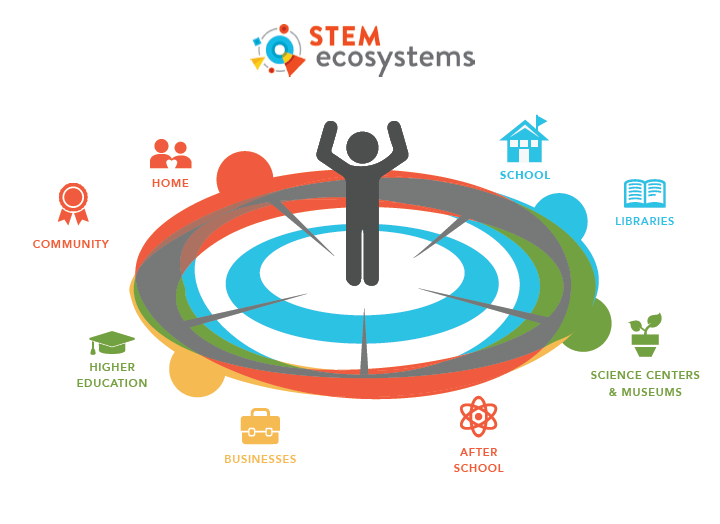Design Principles
What are STEM Ecosystems?
Menu
The STEM Learning Ecosystems Community of Practice is A movement to transform how students learn, how educators teach and how society embraces STEM education in order to prepare better and stronger futures.
STEM Learning Ecosystems are based on a few simple beliefs:
- All children need and deserve a chance to reach their potential.
- Learning doesn’t and can’t happen in silos.
- Society needs to prepare the next generation to lead and thrive in a world dominated by technological advances and more intentionally cultivate pathways for post-secondary success.
- A strong STEM education equips students with knowledge, skills and dispositions that are necessary for a fast-paced, information-driven world.
And the STEM Learning Ecosystems Community of Practice is governed by the following Design Principles:
- Value and promote equity, diversity and inclusion in all aspects of individual and collaborative decision-making.
- Pursue a collective advocacy approach to those who influence policy at all levels, including federal, state, regional and local policy to support a STEM for ALL agenda with unique supports for each learner.
- Deepen and broaden the understanding of what is working and why using multiple instruments that measure the potential and promise of SLECoP initiatives.
- Promote best practices, shared resources, peer learning, leadership development and strong internal and external communications.
- Seek opportunities that provide cross-cutting and aligned STEM education, workforce and community economic development options.
- Embed a system of onboarding and coaching, rooted in the collective experiences of the SLECoP, for new and existing ecosystems.
- Organize through collaboration, transparency and democratic ideals to sustain the reciprocal benefits of the Community of Practice.

KEY STAKEHOLDERS IN A STEM LEARNING ECOSYSTEM INCLUDE:
- A credible, highly engaged lead organization committed to collaborative practice
- Schools and school districts
- Out-of-school time (OST) systems/programs
- STEM-expert museums and science centers
- Institutions of higher education
- STEM-related companies
- Businesses that recognize the need for STEM competencies
- Libraries
- Community-based organizations
- Philanthropies
- Families and parent organizations
- Youth organizations

